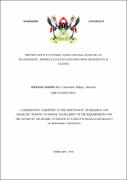| dc.description.abstract | Aflatoxins are lethal and carcinogenic secondary metabolites produced mainly by fungi of the Aspergillus genus, key among which is Aspergillus flavus. Previous research has shown that Ugandans are chronically exposed to these carcinogens and yet breeding A. flavus resistant varieties can be a sustainable solution to this problem. This study aimed at providing novel knowledge to groundnut breeders on which genes are suitable to silence in A. flavus so as to inhibit its growth using the RNAi technique triggered by dsRNA. Ten A. flavus isolates were isolated on Modified Rose Bengal Agar from 43 groundnut seed samples collected from Tororo, Soroti and Kamuli districts in Eastern Uganda and an Agraquant total aflatoxin ELISA kit was used to determine the amount of aflatoxins they produce. Only one isolate was non-toxigenic while others produced total aflatoxin ranging from five to over 2000 parts per billion. Thus there is diversity in A. flavus based on aflatoxin production ability. To determine the suitable genes for RNAi silencing in A. flavus, dsRNAs specific to 13 essential genes were transcribed in vitro using a T7 transcription kit. A. flavus spores were then exposed to these dsRNAs or sterile water for the controls and plated on ¼ strength PDA. Percentage spore growth inhibition was calculated and this spore growth inhibition data was subjected to ANOVA. Spore growth inhibition was significantly higher in all spores treated with dsRNAs targeting A. flavus essential genes in comparison to the controls treated with sterile water (df = 13, p < 0.001). Amongst the dsRNA treatments, silencing UBI, COH, 26s, ATP, PPK, IMP and ABC genes resulted in significantly higher spore growth inhibition than silencing GTT, HEL, PTRs, EXP, DRF and MOT genes (df = 13, p < 0.001). This study thus recommends UBI, COH, 26s, ATP, PPK, IMP and ABC as the suitable genes for RNAi silencing of A. flavus in vivo and also recommends a follow up study to establish the molecular basis for A. flavus diversity based on aflatoxin production ability. | en_US |



